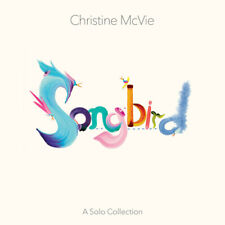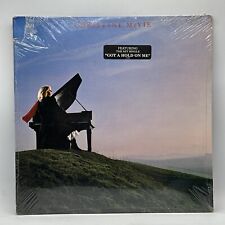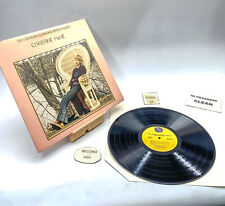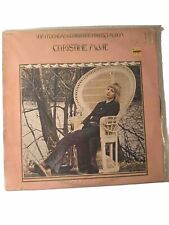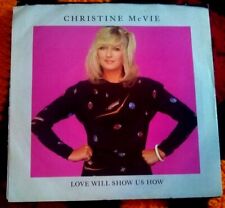Fleetwood Mac Delivers But Eagles Don't Fly
By Al Aronowitz
Long and eagerly awaited, Fleetwood Mac's "Tusk" comes as the most spectacular event in records since Stevie Wonder's "Songs in the Key of Life." Less of an event is the release of "The Long Run" by the Eagles, who have delivered a workmanlike disc full of neither disappointments nor supprises. "Tusk" stretches the limits of the recording medium. "The Long Run" stays safely within them.
Fleetwood Mac's "Rumours," released almost three years ago, sold 14 million copies, and the record industry's anticipation of "tusk" has been somewhat more intense than waiting for ketchup out of a bottle. One of the maxims of the industry is that a big hit brings people into the stores. Except for its double-disc price of $15.98, "Tusk" ought to leave "Rumours" in the dust, conferring a new regality on Fleetwood Mac.
"Tusk" ought to do for Fleetwood Mac what "Sgt. Pepper" did for the Beatles, which was to wrench recognition from the adult establishment, not just for commercial success for esthetics but because the thrust of the music finally bridged the generation gap. But "Tusk" is not as tight as "Sgt. Pepper." It's more reminiscent of the Beatles' double-disc "White" album because it has more room to express the sharp musical differences between the three songwriters of the group, Lindsey Buckingham, Christine McVie and Stevie Nicks.
Certainly "Tusk" ought to skyrocket Fleetwood Mac out of the strictly teeny-bopper category that last year made the Capital Centre think it could present the group so appallingly, with general-admission tickets and no seats on the floor so that you had to stand in the crush as if you were watching the correct from a cattle car.
The surprises on "Tusk" are provided mainly by Buckingham, who sheds his pretty-boy image with this album to emerge as an intense John Lennon-like genius, with a studio in his house where he experiments with sounds and syncopation, and lyrics so cutting they don't even leave scars.
Buckingham would record tapes at home and bring them into the studio for the other in the group to hear. They began to understand what he was trying to do and got behind it, contributing fills, rhythms and harmonies, sometimes in nonsensical whispers, that track enigmatically through both discs.
The most mysterious song is the title cut, "Tusk," for which drummer manager Mike Fleetwood provided the drum track and then rented Dodger Stadium for overduds by the horns of the University of Southern California Trojan Marching Band. Released as a single with a background of unintelligible crowd noises, and acid lyrics, "Tusk" will probably be the first hit off the album.
The album emerges as a personal triumph for Buckingham, with the credit on the sleeve reading, "Produced by Fleetwood Mac (Special Thanks To Lindsey Buckingham)." But there are other surprises. When Stevie Nicks sings "Sara," a tune that could easily be criticized as a construction of '50ish schlock with the same melody as Love Unlimited's "Love's There," she sings her fragile lyrics so beautifully you just might find tears running down your cheeks.
"Tusk" leaves you at a loss to compare Fleetwood Mac with any other group except the Beatles, largely because of the depth on its songwriting bench. If Buckingham is Lennon, then Stevie Nicks is Paul McCartney. She knows enough about what delights the ear to end up the big moneymaker.
Still there is a difference, and that difference is women. As others have already pointed out, Fleetwood Mac is the first group of the Beatles' caliber to integrate women so successfully.
When "Tusk" will not surprise you is in the unmistakable Fleetwood Mac sound that you remember from "You Make Loving Fun." It's as haunting as ever but embarrassingly predicted, with bassist John McVie favoring pedal tones in eighth notes like a rotor, while Buckingham's guitar contributes bluesy licks in a two chord vamp.
But the magic is in the interaction of the group, in the performances and in the feel, and especially in the psychic communication that goes on among them. Fleetwood Mac pumps you full of energy, romantic and mellow, without dulling the edge you need to cut your way through reality.
The only anxiety you get from "Tusk" is wondering how much longer this cartel of talent, featuring two pairs of ex-lovers, can keep their egos, tempers and band intact.
As for the Eagles, "The Long Run" is far from a disaster. It's just another Eagles album. There is experimentation throughout the disc and even at their worst, the Eagles are nothing short of great, but there are no cuts on "The Long Run" that achieve the brilliance of "Lyin' Eyes" or "Hotel California" or even "Life in the Fast Lane."
Eagles fans will be well satisfied with this album, which is already No. 1 on the pop charts. "Heartache Tonight," the first single off the album, is also a hit. "I Can't Tell You Why," sung by the group's new bass player, Timothy Schmit, formerly with Poco, promises to be another. "In the City," featuring Joe Walsh, could be still one more. But whether any of these cuts will grow on us the way previous Eagles hits did is still questionable. These are all more solid than inspired.
To experience the Eagles' sound is always a job. The Eagles are also storytellers, and their stories are superlatively told. In "The Long Run," the Eagles maintain their quality, but they don't reach any further.
Thanks to Anusha for the submission.





